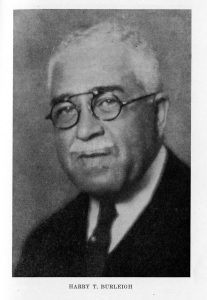Burleigh the Builder
Words by Okara Imani
Erecting pillars, paving the way, laying the foundation: all acts of a builder, concepts mastered by an architect. Cultivating cultural crossover that broadens the span of a creative realm; not only for the cultures collaborating but for the art form itself. Now if that doesn’t ring to the tune of Mister Harry Thacker —-Burleigh the Builder, as I now like to think of him — then I don’t know what does!
Growing up, young Harry T was imparted with serious drive, ambition, and talent by his grandfather Hamilton Waters. Having been a slave before buying his family’s freedom, Granddaddy Waters bestowed Burleigh with his “exceptionally melodious voice,” and also passionately passed down an expansive repertoire of true spirituals and slave songs to little Harry and his brother Reginald. Even before our Builder was conceived of, his grandfather was already laying the foundations of an immense legacy in personal agency and burgeoning heritage. Upon this foundation, Burleigh built a massive platform for Black music professionals and vocalists in the classical realm, with his art song, spiritual, and folk song arrangements becoming a staple in vocal repertoire in the 1910s and ’20s.

His marvelous, inherited baritone voice got him enlisted as a soloist at St George Episcopal Church, at a time when a vote was necessary to even consider a Black vocalist; a vote of which JP Morgan himself voted in favor and lasted until Harry Thacker passed away! His vocal arrangements put him in the way of our favorite “accidental activist,” Marian Anderson, who was breaking her professional barriers performing her songs, Burleigh’s, and others for integrated audiences. That’s Burleigh seeing the ripple effect of his efforts, in real-time, amongst his Black classical peers; something cathartic to any space maker or activist.
His work impacted many of his contemporaries, which, of course, includes classical professionals outside his cultural community. Principally, for me, he studied at The National Conservatory of Music (NY) under the director, Antonin Dvořák; one of my favorite European composers and renowned for his mastery of folk and art songs in the classical arena. Burleigh worked on campus during his degree program and caught the ear of Dvořák while cleaning on the job. It appears that the Czech composer not only delighted in hearing Burleigh sing Negro spirituals and folk songs but went so far as to credit them for major creative inspiration in his composing process. He was ultimately quoted as saying “In the Negro melodies of America, I discover all that is needed for a great and noble school of music;” a sparkling endorsement and indication of Burleigh’s powerful influence and skill in building those bridges and platforms I keep going on about, eh?
Burleigh is so relevant and relatable to my experience as a Black classical music graduate, it’s a platform he helped build upon which I was able to stand and take up space during my degree program. He’s part of the reason I was able to find repertoire pieces sung by Black opera divas that I looked up to so fondly. Shoot, he’s partially the reason I’m here writing this for you to read today, on behalf of Joshua Thompson who exclusively performs Black compositions, and Angela Brown who is a living opera icon– invited by Classical Music Indy who has spotlighted our Melanated Moments in Classical Music; all of us expounding upon the foundations laid by Harry T Burleigh. We are living in a house Burleigh built!
Listen to this episode of the Melanated Moments in Classical Music podcast.







Leave a Reply